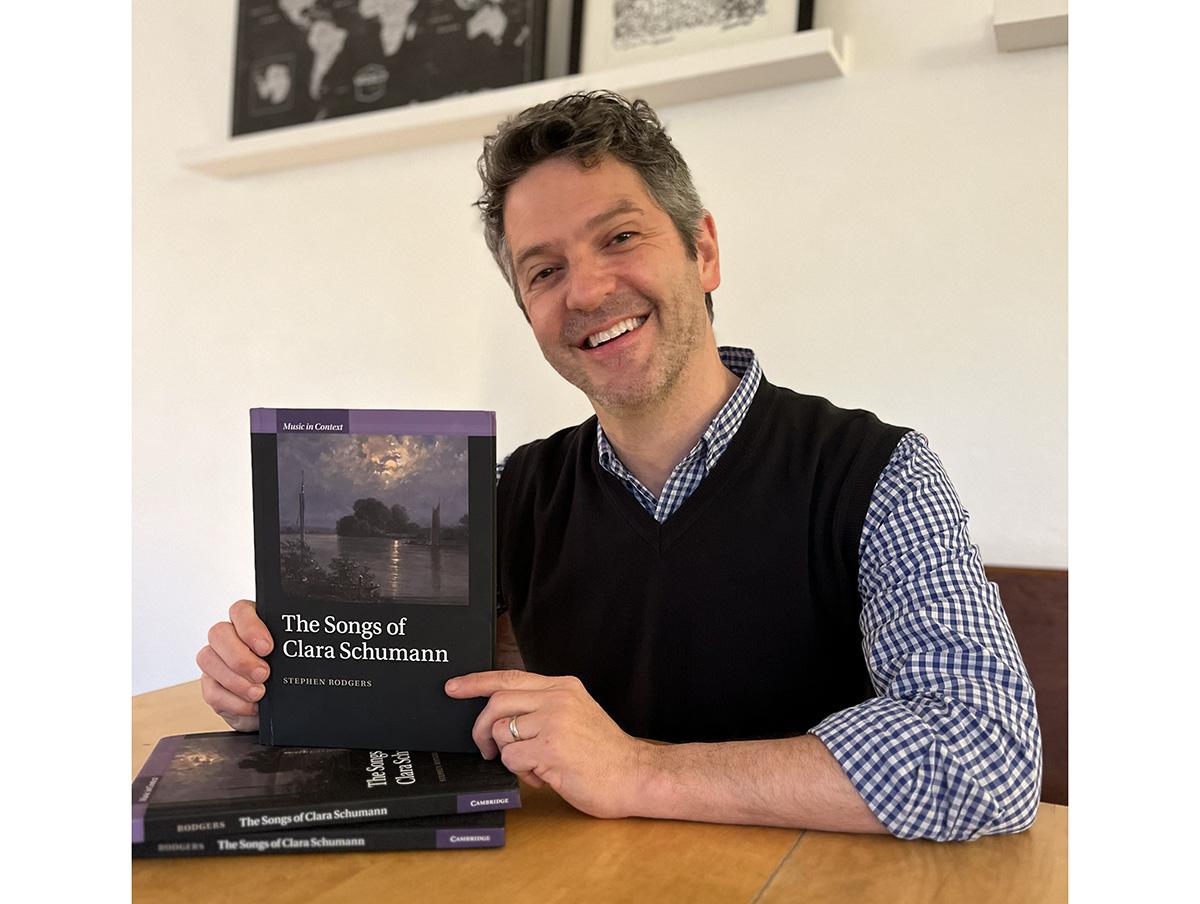
by Stephen Rodgers, Professor and Edmund A. Cykler Chair in Music, School of Music and Dance
In April 2023, Cambridge University Press published my book, The Songs of Clara Schumann, the first book in Cambridge’s Music in Context series to be devoted to the music of a woman composer. Clara Schumann was one of the most talented musicians of the 19th century—a formidable pianist who maintained an active career as a concert performer for 63 years, and a composer who wrote piano music, songs, choral works, chamber music, and instrumental music. But to this day she lies in the shadow of her more famous husband, the composer Robert Schumann. My book places Clara Schumann’s music front and center, focusing on her small but extraordinary output of songs.
The book wouldn’t have happened without the generous support of a faculty grant from the Center for the Study of Women in Society, which I used to complete the final two chapters. It also wouldn’t exist had I not been fortunate enough to attend a conference in June 2019 at the University of Oxford, called “Clara Schumann (née Wieck) and her World.” I barely slept on the plane ride home, so intoxicated was I with what I heard and experienced over the course of those three days. I opened the two volumes of Clara Schumann’s songs and reread every page, returning to songs I was familiar with but didn’t know inside and out, savoring every bar. By the time I arrived back in Oregon I was convinced that if we already had books on the songs of Franz Schubert, Hugo Wolf, Johannes Brahms, and Robert Schumann, why couldn’t we have one on the songs of Clara Schumann?
For the fact is, even as the fields of music theory and musicology—like so many other humanistic disciplines—have sought to expand the canon, books on music by men still far outnumber those on music by women. And in many cases, we know more about the lives of these women than we do about the works they created. This is certainly true of Clara Schumann, whose relationship with Robert Schumann and career as a pianist have received more scholarly attention than her work as a composer.
One of my goals in the book is to illuminate Clara Schumann’s under-examined songs and show what makes them distinctive, affecting, and lasting—such as their long-breathed melodies, their tendency to undermine moments of musical closure (and the moments of poetic closure that go with them), and their inventive piano textures. Yet the book isn’t only about her songs. An equally important goal is to use her songs to raise broader questions about the analysis of music by women composers more generally. The book treats Clara Schumann’s songs as a prism, casting light not just on them but also through them, using her songs to make claims that extend beyond them.
One such claim has to do with the relationship between Clara Schumann’s and Robert Schumann’s musical styles, and the common tendency to tie female composers to the dominant male figures in their lives. Historically, Clara Schumann’s music has been discussed mainly in relation to her husband’s: her music has been treated as merely more or less like his (and, all too often, as less successful than his), and the rules of engagement have been determined by his musical aims and predilections rather than her own. My book is guided by the conviction that Clara Schumann’s music ought to be taken on its own terms, so that we can get a complete and accurate picture of her style and her achievements as a song composer. I also believe that this is a useful way to study ticularly those who stand directly in the shadow of a more famous male composer (Fanny Hensel, the elder sister of Felix Mendelssohn, is but one other example).
A second claim I make in the book is that music analysis has a vital role to play in demonstrating Clara Schumann’s importance to the history of 19th-century song—and, by extension, in developing a deeper understanding of the achievements of women composers, whose music is still woefully underexplored compared with the music of their male counterparts. Scholars, students, and audiences will only come to understand the historical importance of this singular artistic figure if they come to understand the quality of the music she composed. This means hearing it, of course, but it also means reading about it—learning through articles and books as much as through recordings and performances what makes her creative voice so unmistakable and compelling. I hope my book provides an entry-point for those who don’t yet know Clara Schumann’s glorious songs and a deeper dive for those who want to get to know them better—and I’m grateful to CSWS for making the project possible.
—Stephen Rodgers is the Edmund A. Cykler Chair in Music and Professor of Music Theory and Musicianship in the School of Music and Dance. He received a 2021 CSWS Faculty Research Grant for this project.

